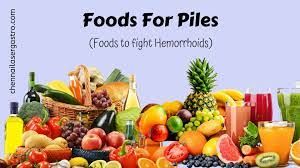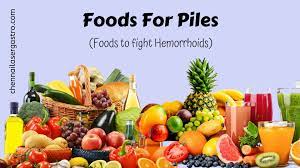
Best Diet Plan for Piles Patients

We all enjoy eating oily, spicy, and junk food while knowing how bad for our health they may be. The ailments that were formerly uncommon have now become frequent due to changes in our basic diet plan for piles is one such illness.
Individuals could choose bad foods and lead unhealthy lifestyles, which can raise their risk of developing heaps. One of the conditions that is simple to both prevent and cure is piles. Choosing the appropriate diet is a simple approach to avoid or treat piles.
The Best Diet for Piles
The major objectives of the diet plan for piles are to lessen bowel movement straining and to stop further piles-related disorders.. The following foods are recommended as pile-busting fare:
Leafy vegetables: These meals are nourishing and high in fibre and antioxidants, which are beneficial for digestion and stomach health. In your diet plan for piles, you can include foods like celery, radish greens, mustard greens, spinach, fenugreek, etc.
Whole grains: Brown rice, oatmeal, bran cereals, whole grain flour, and multigrain bread are all examples of whole grains that are beneficial for piles. These foods' high fibre content helps to bulk up the stools and encourage bowel motions.
Fresh fruits: Fresh fruits are a great source of fibre, vitamins, and minerals, especially when eaten with their skin on. Consuming fresh fruits like apples, grapes, bananas, and oranges helps to improve digestion and encourages regular bowel movements.
Sprouts: Sprouts are a good source of calcium, fibre, vitamin C, and proteins. Sprouts are a useful food to cure piles because they contain these nutrients. Intestinal discomfort can be relieved with one cup of steamed or boiling sprouts each day.
Curd or Buttermilk: Buttermilk and curd are full of probiotics, which strengthen gut flora and support digestive health. Adding curd or buttermilk in your diet on a regular basis may boost your immunity and digestive health, easing symptoms.
Water: Without enough water intake, the dietary changes indicated above may not be effective. Water helps to soften the gut, break down food, absorb nutrients, and prevent constipation and piles. Hence, drink three to four litres of water a day or more.
Foods to Avoid
Try to stay away from the following meals since they may worsen the signs of piles or raise the risk of developing them.
Foods rich in carbohydrates or fats
Meat, fish, and eggs
Caffeinated foods, such as coffee, tea
Alcohol
Spicy foods
Diet Chart for Piles Patients
A healthy diet is necessary to restore the body's damaged tissues and get rid of piles. If you have a diet plan for piles, you should eat a diet heavy in fibre. Fibre gives faeces weight and softens them, easing discomfort. To minimise digestive issues, limit your intake of hot and greasy foods. To get rid of piles, adhere to the suggested eating plan.
Early Morning- Warm water + 1 tsp. Flax seed, Aloe Vera, or Wheatgrass juice
Breakfast-Oats, Missi Roti, Stuffed Chapati, Chapati with Veg or Dal, Veg Idli, Veg Seviyan (Vermicelli), Veg Upma (Semolina), Veg Daliya (Broken Wheat Porridge),
Mid-morning-Fruit juice, fruit, coconut milk, lemon water, herbal tea, prune juice, and coconut water
Lunch-Brown rice with chapati with vegetables and chicken or dal (once a week)
Evening- Roasted chana, homemade soup, vermicelli, green tea, herbal tea, and sprouts
Dinner- Chapati + Vegetable + Dal
Appreciate the creator